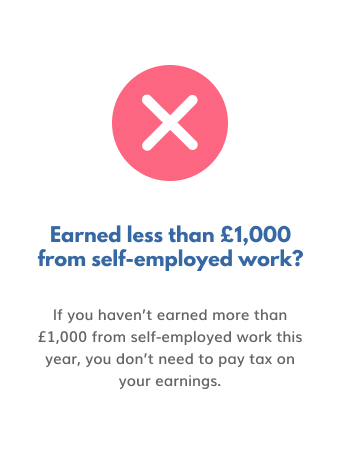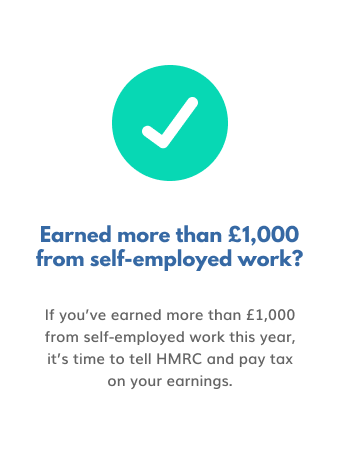

The Complete Self Assessment Tax Return Checklist
There’s a lot to remember if you need to submit a Self Assessment tax return to HMRC. To help you keep track, our Self Assessment checklist details everything you need to include when sending your tax return.
Do I need to submit a Self Assessment tax return?
If you earned more than the £1,000 trading allowance from self-employed sole trader or freelance work in the last tax year, or more than £1,000 of property income, then you’ll usually need to submit a Self Assessment tax return.


You’ll also need to send a return if you’re a partner in a business partnership, or if you earn money which isn’t from your employer or pension. For instance, if you receive dividend payments, and need to report them so you can pay Dividend Tax.
Where do I find my employment details for Self Assessment?
Your Self Assessment tax return will ask for the details of any employments or directorships you held during the tax year. This might include work that you’ve done for an employer, or as an employee or director of your own company.
You’ll need to provide the details of how much you earned from each employment, and any tax that you’ve already paid on it. For instance, the tax that your employer deducts when they pay your wages. If you submit your Self Assessment tax return using the paper version of the form, you’ll need to include a separate supplementary SA102 form for each one.
- Earnings and tax information will be shown on your P60 for that tax year (or your P45 if you left).
- If you worked for more than one employer in a tax year, make sure you include all of them on your return! You’ll need to supply the PAYE reference number (also known as an Employer Reference Number) for each one too.
- You’ll also need to tell HMRC about any employee Benefits in Kind that you receive. Your employer should provide the details of any benefits they report.
Income from a pension
Your Self Assessment tax return should also include the details of any pension income or taxable lump sums that you receive in a tax year.
- If it’s an occupational pension (one set up by your employer) then your P60 or certificate of pension paid will show how much pension you’ve received
- Your notification letter will tell you information about your state pension
- The provider will send you a pension statement if you have a private pension
It’s also useful to declare payments you make towards your pension pot, to make sure you don’t miss out on any tax relief!
Your self-employment and partnerships
Whether you made a profit or a loss you’ll need to include your self-employment activities on your tax return. You should complete a separate section for each self-employment (or a separate SA103 Form if you submit a paper return).
- Refer to your bookkeeping records for the income and expenses figures that you’ll need to report
Investment and other income
If you receive any income from investments or other sources, then declare this on your Self Assessment return too. There are several potential sources, so we’ve set out a table which shows the kind of investment income you might have, and which documents show the information you need.
| Investment income type | Documents to refer to |
| Dividends from a UK company or unit trust, including shares (or units in lieu of dividends) | Dividend/distribution vouchers showing the dividend received, as well as the date and tax credit. |
| Income from trusts, settlements, Deeds of Covenant and estates | R185 or certificates of income and tax deducted. |
| Income from property | All income and expenditure records, including any mortgage interest statements. |
| Interest from banks and building societies | Certificates of interest received and tax deducted. |
| Interest from banks or building societies, received gross | Statements of interest received. |
| Money withdrawn from life assurance policies or bonds | Your Chargeable Event Certificate from the life assurance company. |
| National Savings interest received gross | Statements of interest received. |
| Overseas income | This might be in the form of dividend vouchers or other documents. |
Your other relevant outgoings
There might be costs associated with your self-employed business that you can also include on your Self Assessment tax return.
| Types of outgoings | Documents or examples |
| Employment expenses |
|
| Gift Aid or Deed of Covenant payments |
|
| Qualifying loans and mortgages |
|
| Student Loan repayments |
|
| Other payments qualifying for tax relief |
|
Capital Transactions
If you make a profit (or ‘gain’) from disposing of an asset then you might need to report this on your Self Assessment tax return in order to pay Capital Gains Tax. Disposing of an asset usually this means that you’ve sold it, but it can also mean that you’ve given it away, swapped it, or been compensated in another way for its loss.
Tax returns can be stressful! Learn more about our online accounting services, including support with your Self Assessment tax return. Call 020 3355 4047 and get an instant online quote.
Want to learn more?
Subscribe to our newsletter to get accounting tips like this right to your inbox

Read more posts...

Accounting for Cash Payments in UK Businesses
3rd March 2026Card machines, Apple Pay, and bank transfers may be the norm these days, but cash is far from dead. This blog breaks…
Read More
When Should I Submit My 2025/26 Self Assessment Tax Return?
2nd March 2026You don’t have to wait for the January deadline, and can submit your Self Assessment return as soon as the tax year…
Read More
Transferring Assets to A Limited Company
1st March 2026Incorporating your company is a big, exciting step, but there’s a bit of a hill to climb first before you can enjoy…
Read MoreConfirm Transactions
The number of monthly transactions you have entered based on your turnover seem high. A transaction is one bookkeeping entry such as a sale, purchase, payment or receipt. Are you sure this is correct?
Please contact our sales team if you’re unsure
VAT Returns
It is unlikely you will need this service, unless you are voluntarily registered for VAT.
Are you sure this is correct?
Call us on 020 3355 4047 if you’re not sure.
MTD IT Quarterly Updates
Your final, end of year MTD Income Tax submission is included in your fee, without this add-on service.
We would recommend you submit the quarterly updates yourself using Pandle or alternative bookkeeping software.
However, if you would prefer us to submit these quarterly updates for you, there is an additional fee of £35.00 per month.
Call us on 020 3355 4047 if you’re not sure.
Bookkeeping
You will receive our bookkeeping software Pandle for free, as part of your package.
You can use this to complete your own bookkeeping, or we can provide a quote to complete your bookkeeping for you.
Please select and option below:
Call us on 020 3355 4047 if you’re not sure.

